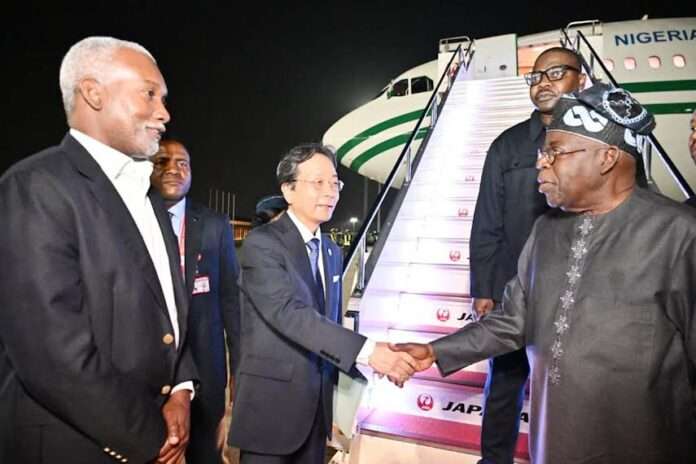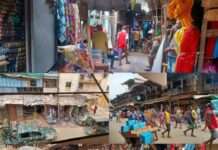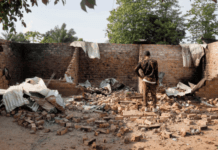

…As Nigerians decry empty booth at summit
…Japan pledges $5.5bn fund to Africa
President Bola Ahmed Tinubu’s official visit to Japan for the 9th Tokyo International Conference on African Development (TICAD9) has stirred mixed reactions, as Nigerians balance optimism over global commitments with unease at lapses in Nigeria’s representation at the summit.
While policymakers, investors and African leaders converged in Tokyo, Nigeria’s exhibition booth, expected to showcase the nation’s economic potential, cultural wealth and investment opportunities, was left unattended on the opening day.
Japan meanwhile drew international attention with the announcement of a $5.5 billion pledge to support infrastructure, healthcare, climate resilience and technology programmes across Africa.
The absence of Nigerian officials at the booth first came to light when Tunde Oladipo, a Nigerian entrepreneur based in Japan, shared photographs and videos on X (formerly Twitter). Faced with questions from delegates, Oladipo said he felt obliged to step in.
“I felt compelled to step in,” he explained. “People wanted to know about Nigerian investment opportunities, technology startups, agriculture, energy and cultural enterprises. It was both embarrassing and humbling to represent my country unofficially.”
The revelation provoked a flurry of online criticism. @ChineduOkoro wrote: “We fly hundreds of kilometres with grand delegations, yet can’t man our own exhibition. How do we expect foreign investors to take us seriously?” @AdannaIfunanya remarked: “Our representatives abroad appear more concerned with protocol than performance. It’s discouraging and reflects poorly on our governance.”
Another user, @EmekaUmeh, observed: “The Japanese are eager to collaborate, but Nigeria seems absent in action. This is an international lesson in how preparation matters.”
The African Democratic Congress (ADC) also weighed in, describing the development as a costly administrative lapse. Interim spokesperson Bolaji Abdullahi said: “Leaving our booth unattended is not just an oversight; it undermines Nigeria’s credibility on the global stage. Strategic engagement is not optional at summits of this magnitude. With billions pledged for development, we cannot afford symbolic participation without action.”
Despite the embarrassment, analysts have underlined the opportunities within Japan’s $5.5 billion funding commitment. The package will finance African-led infrastructure projects, healthcare systems, technology hubs and climate resilience programmes. If Nigeria can secure a significant share, it could stimulate industrialisation, foster trade and generate employment across key sectors.
President Tinubu arrived in Japan on 18 August, received at Haneda International Airport by Hideo Matsubara, Japan’s ambassador responsible for TICAD. Speaking to reporters, Tinubu said the visit underscored Nigeria’s commitment to forging lasting partnerships.
“This visit is about more than presence; it is about building bridges that will deliver tangible economic benefits. Nigeria is open for business, and we are committed to harnessing opportunities that advance our developmental objectives,” he stated.
Nevertheless, the unattended booth has raised broader concerns about Nigeria’s coordination in high-profile international forums. Civic commentators have pointed to a disconnect between the President’s official engagements and the absence of functional representation on the ground, calling for stronger planning and accountability.
Reactions on social media continued as citizens expressed frustration at the missed opportunity. @AliuAdebayo wrote: “It’s disheartening that citizens abroad are forced to step in when official representatives are absent. Coordination failures like this risk our reputation and future partnerships.” @NgoziOkechukwu added: “This demonstrates a lack of prioritisation. Our delegation should have been fully prepared to showcase our industries and investment climate.”
TICAD9, jointly organised by Japan, the United Nations, the African Union Commission and the World Bank, serves as a platform for African nations to deliberate on sustainable development, infrastructure, urbanisation, climate resilience, healthcare and technological transformation.
This year’s programme has also given prominence to maternal and child health, antimicrobial resistance and renewable energy, underscoring the importance of visible and effective participation by African delegations.










